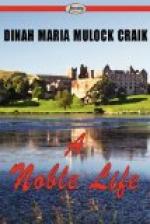They were absolutely penniless. Helen’s boy had been born only a day or two after their arrival at Edinburg. Her husband’s illness increased suddenly at the last, but he had not been quite incapacitated till she had gained a little strength, so as to be able to nurse him. But how she had done it—how then and for many months past she had contrived to keep body and soul together, to endure fatigue, privation, mental anguish, and physical weakness, was, according to good Mrs. Campbell, who heard and guessed a great deal more than she chose to tell, “just wonderful’.” It could only be accounted for by Helen’s natural vigor of constitution, and by that preternatural strength and courage which Nature supplies to even the saddest form of motherhood.
And now her brief term of wifehood—she had yet not been married two years—was over forever, and Helen Bruce was left a mother only. It was easy to see that she would be one of those women who remain such— mothers, and nothing but mothers, to the end of their days.
“She’s ower young for me to say it o’ her,” observed Mrs. Campbell, in one of the long consultations that she and the earl held together concerning Helen, who was of necessity given over almost exclusively to the good woman’s charge; “but ye’ll see, my lord, she will look nae mair at any mortal man. She’ll just spend her days in tending that wean o’ hers—and a sweet bit thing it is, ye ken—by-and-by she’ll get blithe and bonnie again. She’ll be aye gentle and kind, and no dreary, but she’ll never marry. Puir Miss Helen! She’ll be ane o’ thae widows that the apostle tells o’—that are ’widows indeed’.”
And Mrs. Campbell, who herself was one of the number, heaved a sigh— perhaps for Helen, perhaps for herself, and for one whose very name was now forgotten; who had gone down to the bottom of Loch Beg when the Earl’s father was drowned, and never afterward been seen, living or dead, by any mortal eye.
The earl gave no answer to his good nurse’s gossip. He contented himself with making all arrangements for poor Helen’s comfort, and taking care that she should be supplied with every luxury befitting not alone Captain Bruce’s wife and Mr. Cardross’s daughter, but the “cousin” of the Earl of Cairnforth. And now, whenever he spoke of her, it was invariably and punctiliously as “my cousin.”
The baby too—Mrs. Campbell’s truly feminine soul was exalted to infinte delight and pride at being employed by the earl to procure the most magnificent stock of baby clothes that Edinburg could supply. No young heir to a peerage could be appareled more splendidly than was, within a few days, Helen’s boy. He was the admiration of the whole hotel; and when his mother made some weak resistance, she received a gentle message to the effect that the Earl of Cairnforth begged, as a special favor, to be allowed to do exactly as he liked with his little “cousin”.
And every morning, punctual to the hour, the earl had himself taken up stairs into the infantile kingdom of which Mrs. Campbell was installed once more as head nurse, where he would sit watching with an amused curiosity, that was not without its pathos, the little creature so lately come into the world—to him, unfamiliar with babies, such a wondrous mystery. Alas! A mystery which it was his lot to behold—as all the joys of life—from the outside.




